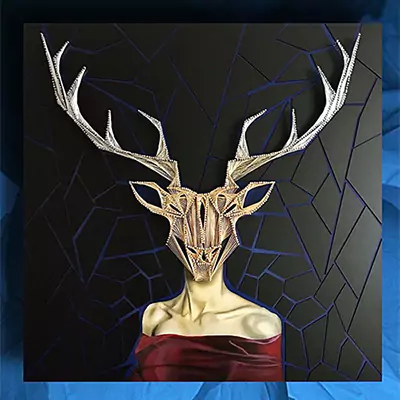Description
“Culture is the product of evolution over the course of millions of years. Our brain relative to the brains’ of others is wired to our physical and social environment. As a result, the human self desires to create a conceptual device to experience the world, using the power of prediction. Through words, these concepts are transferred between humans. While we are responsible in changing our conceptions after childhood, we can also influence other people through words.
In this collection, women are depicted with wired disguises. Surrounded by a world of language, these women have no choice but to drown in said world to discover their identities. Shaped by the “Super-ego” these masks have been woven into their faces as their self-alienation remains hidden.
These masks are evidence of the circumstances created in the mind such as power, insecurity, fear, love, and so on. They re-emerge after experiencing signs of familiarity. But they are not a part of their faces and can be changed once they become the architects of their fate, forging new memories and experiences.
In Zizek’s narrative of Lacan’s psychoanalysis, “Superego” is any external concept that affects humans. Despite its fragile nature, this symbolic order plays a significant role in shaping our experiences; existing only when it is believed in .And finally, the “Superego” itself is represented by broken fragments surrounding the characters.” -Samin Mirdavoudi
Specifications
Description
“Culture is the product of evolution over the course of millions of years. Our brain relative to the brains’ of others is wired to our physical and social environment. As a result, the human self desires to create a conceptual device to experience the world, using the power of prediction. Through words, these concepts are transferred between humans. While we are responsible in changing our conceptions after childhood, we can also influence other people through words.
In this collection, women are depicted with wired disguises. Surrounded by a world of language, these women have no choice but to drown in said world to discover their identities. Shaped by the “Super-ego” these masks have been woven into their faces as their self-alienation remains hidden.
These masks are evidence of the circumstances created in the mind such as power, insecurity, fear, love, and so on. They re-emerge after experiencing signs of familiarity. But they are not a part of their faces and can be changed once they become the architects of their fate, forging new memories and experiences.
In Zizek’s narrative of Lacan’s psychoanalysis, “Superego” is any external concept that affects humans. Despite its fragile nature, this symbolic order plays a significant role in shaping our experiences; existing only when it is believed in .And finally, the “Superego” itself is represented by broken fragments surrounding the characters.” -Samin Mirdavoudi

